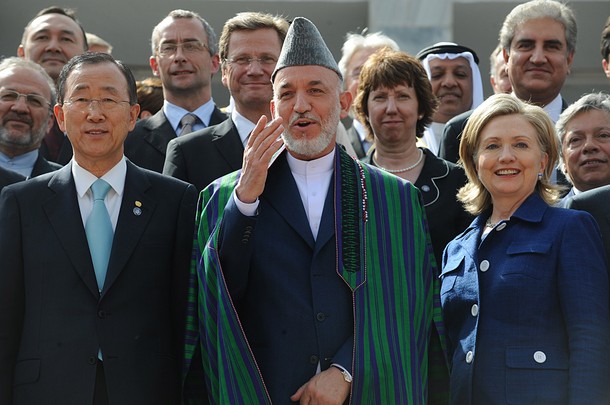
From Alissa J. Rubin, Richard A. Oppel, Jr. and Mark Landler, the New York Times: The United States, European and other foreign leaders met here Tuesday to pledge anew their support for Afghanistan as they committed to complete transition of security and budgeting responsibility to the Afghan government by 2014. They acknowledged that neither the public in their own countries nor the Afghan people had much patience left. …
Transition to Afghan control is also the exit plan for NATO troops and member countries have differing senses of urgency. The western European democracies with the most troops — Britain, France and Germany — are under great popular pressure to reduce their presence while the United States, which has the heaviest military presence, is somewhat more focused on how to give the best chance to its counter-insurgency strategy. …
She [Secretary of State Hillary Clinton] also endeavored to reduce somewhat the significance of the July 2011 date, which President Obama set in his speech outlining his Afghan policy last fall as the date when he would begin to bring troops home.
“The July 2011 date captures both our sense of urgency and the strength of our resolve,” Mrs. Clinton said. “The transition process is too important to push off indefinitely. But this date is the start of a new phase, not the end of our involvement. …”
The security transition timetable, though not the main focus of this meeting, is perhaps the most significant element for NATO leaders most of whom will face election challenges well before 2014. The European countries are looking for a more concrete withdrawal plan for their troops that they can advertise to their voters, while the United States military leadership, is hewing to a “conditions-based” approach that allows them to slow down in areas where the insurgency appears more tenacious or where Afghan troops and police appear to have inadequate capabilities. …
On Monday, the new American and NATO commander for Afghanistan, Gen. David H. Petraeus, and the NATO secretary general, Anders Fogh Rasmussen, traveled to the south of the country together.
According to one NATO official, they have had “frank discussions.”
“There are indications that the timeline and what constitutes the conditions for transition are possibly different in terms of what NATO is thinking and what Petraeus may be thinking as he settles into an understanding of what he is dealing with in this insurgency,” said the NATO official, who, like several other diplomats and officials interviewed on Monday, refused to be identified by name because of the delicacy of the issue.
But another official from the American-led NATO coalition insisted that General Petraeus and Mr. Rasmussen were not in disagreement. “They see eye to eye,” that official said, “and anyone who reports otherwise clearly has missed key conversations, which is understandable, because some have been one on one.” (photo: Getty)
Image: afp%207%2020%2010%20Ban%20Ki%20moon%20Hamid%20Karzai%20Hillary%20Clinton.jpg
